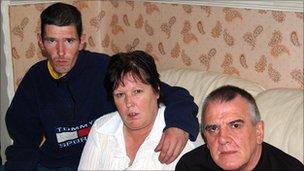Inquiry call over North East Ambulance Service error
- Published

Steven Barley's parents and brother said they wanted answers over his death
A Middlesbrough councillor is calling for an independent inquiry into a family's claims that a man died because a 999 call handler refused to send an ambulance fast enough.
Steven Barley suffered a seizure and chest pains before his death in June.
The family dialled 999 but were told his condition was not life threatening. The ambulance service has since admitted a mistake was made.
Councillor Barry Coppinger said he would write to the secretary of state.
Mr Coppinger is a former chair of the town's emergency planning committee.
"I do think there is a need for an independent inquiry and assessment into what the NEAS is doing," he said.
Two inquiries
"An internal inquiry is not good enough when a life has been lost."
He said two inquiries should be carried out, one into Mr Barley's case and a general inquiry into how the North East Ambulance Trust is operated.
He said this second inquiry was needed following allegations that the call handling system was inflexible.
One of those who spoke out was a former ambulance call handler, Karen Breslin, who worked for 11 years at the Teesside control room.
She said: "When you get more of a complex call the system can't deal with that.
"It's a flow chart system and it doesn't know how to deal with one or more problems.
"When you get someone with a multitude of problems, I don't trust it."
The ambulance service has defended its call handling system and its six week training scheme.
In a statement it said the Pathways system used by call handlers to determine whether or not an ambulance was needed had "undergone a full independent evaluation" commissioned by the Department of Health.
- Published1 November 2010